Are you looking for an adventure that not only satisfies your wanderlust but also allows you to immerse yourself in a unique culture? Look no further than a desert safari where you can embrace the traditions and lifestyle of the Bedouin people.
With their rich history, fascinating customs, and welcoming hospitality, the Bedouins offer travelers an unforgettable cultural experience. In this blog post, we’ll dive into the world of Bedouin culture and show you how to fully embrace it on your next desert safari.
Get ready to ride camels, learn survival skills from local guides, taste traditional meals, and gain a new appreciation for global diversity.
Bedouin Culture And Lifestyle
The Bedouin people are a nomadic Arab tribe that has been living in the deserts of the Middle East for centuries. Their lifestyle is shaped by the harsh desert environment, which requires them to be self-sufficient and resourceful.
Family ties are incredibly important in Bedouin culture, with extended families often traveling together and sharing resources. They have a strong sense of community, and hospitality towards guests is highly valued.
The traditional clothing worn by Bedouins consists of loose-fitting garments made from natural fibers such as wool or cotton to protect against the sun’s harsh rays. Men typically wear long robes known as dishdashas, while women dress more modestly, covering their hair and face with veils.
Bedouins have a deep respect for nature, and animals such as camels play an integral role in their way of life. Camel herding is one of their primary means of livelihood, providing not only meat but also milk, wool, leather, and transportation across long distances.
In recent times many Bedouins have transitioned from being nomadic shepherds to settled farmers or merchants due to modernization efforts; however, they still hold on tightly to their cultural identity despite these changes.
By taking part in a desert safari experience, travelers can gain insight into this unique way of life while contributing positively toward local communities through sustainable tourism practices.
Common Practices And Traditions
The Bedouins have a rich cultural heritage, and their practices and traditions have been passed down from generation to generation.
Here are some of the common practices and traditions of the Bedouins:
1.Camel Herding
Camels were essential to the Bedouin way of life, as they served as transportation, pack animals, and a source of food and milk. Today, camel herding is still an important part of Bedouin culture, with many Bedouin families continuing to raise and care for camels.
2.Falconry
Falconry, or the hunting of prey using trained falcons, is another important tradition in Bedouin culture. Bedouin hunters have used falcons for centuries to hunt rabbits, hares, and other small game.
3.Hospitality
The Bedouins are known for their hospitality and generosity towards guests. When travelers visit a Bedouin camp, they are often welcomed with traditional Arabic coffee and dates and invited to share meals and stories with the hosts.
4.Traditional Clothing
The Bedouins have a distinctive style of dress, which reflects their desert lifestyle. Men often wear long robes and headscarves, while women wear brightly colored dresses and veils.
5.Music and Dance
Music and dance are an important part of Bedouin culture, with traditional songs and dances celebrating events such as weddings and religious festivals.
Role of Islam in Bedouin Culture
Islam plays a significant role in Bedouin culture, serving as the foundation of their beliefs and way of life. The Bedouins are deeply rooted in Islamic traditions, customs, and practices that have been passed down from generation to generation.
Prayer is an essential aspect of daily life for the Bedouins. They pray five times a day facing Mecca and observe fasting during Ramadan. During this period, traditional meals such as dates and camel milk are consumed after breaking the fast at sunset. There are some restrictions on entertainment as well. This is the reason why you will see some changes in dhow cruise and desert safari during Ramadan. The entertaining performances like Tanura dance and belly dance are not done during the holy month.
Islamic values also influence social interactions between members of the community. Modesty in dress code is highly valued, with women covering themselves up with abayas when they leave their homes or interact with men outside their immediate family.
The Quranic teachings on hospitality are also evident among the Bedouin people, who take pride in welcoming guests into their tents or homes by offering tea or coffee along with dates. This tradition has remained unchanged for centuries.
Desert Safari Experience
A desert safari is a must-do activity when visiting Dubai, and it’s an excellent way to immerse oneself in Bedouin culture and traditions. Here are some of the activities that travelers can expect to experience on a desert safari:
- Dune Bashing: This exhilarating activity involves driving a 4×4 vehicle over the sand dunes, with steep drops, sharp turns, and thrilling dips. It’s a must-do for anyone seeking an adrenaline rush.
- Camel Riding: Camels are known as the “ship of the desert,” and riding one is an unforgettable experience. Travelers can enjoy a leisurely camel ride through the desert landscape, with the option of posing for photos in traditional Bedouin dresses.
- Sandboarding: If you love snowboarding or surfing, you’ll love sandboarding. This exciting activity involves sliding down the sand dunes on a board, and it’s a great way to feel the rush of the desert winds.
- Henna Painting: Henna painting is a traditional art form in many Middle Eastern cultures, and it’s a popular activity on desert safaris. Travelers can get their hands and feet painted with intricate designs in henna.
- Arabic BBQ Dinner: After a full day of adventure, travelers can relax and enjoy a delicious Arabic BBQ dinner under the stars. The meal typically includes grilled meat, salads, and traditional Arabic sweets, along with music and entertainment from a belly dancer.
Visiting A Traditional Bedouin Village
Visiting a traditional Bedouin village is a highlight of any desert safari experience, and it’s a great way to learn about Bedouin culture and traditions.
Here’s what travelers can expect to see and do during a visit to a Bedouin village:
1. Meet the Locals
Travelers will have the opportunity to meet local Bedouin families and learn about their way of life. They can ask questions, take photos, and even try their hand at traditional activities like camel herding or falconry.
2. Explore the Village
Many Bedouin villages are designed in a circular layout, with tents or huts arranged around a central courtyard. In addition to meeting the locals, travelers can explore the village and get a feel for what life is like in the desert.
3.Try Traditional Food and Drink
Hospitality is a cornerstone of Bedouin culture, and travelers will likely be offered traditional Arabic coffee and dates upon arriving at the village. They may also have the opportunity to try other traditional foods, such as lamb grilled over an open flame.
4.Shop for Handicrafts
Bedouin women are known for their skilled embroidery and weaving, and travelers can often purchase beautiful handicrafts like rugs, bags, and wall hangings made by local artisans.
5.Learn About Bedouin History and Culture
A visit to a Bedouin village provides a unique opportunity to learn about the history and culture of these nomadic people. Visitors can ask questions, listen to stories, and gain a deeper understanding of Bedouin traditions and practices.
Learning Survival Skills From Bedouin Guides
Learning survival skills from Bedouin guides is an exciting and unique part of a desert safari experience. Here are some of the survival skills that travelers can learn from Bedouin guides:
1.Finding Water: One of the most important survival skills in the desert is finding water. Bedouin guides can teach travelers how to find and purify water from natural sources, such as springs or underground wells.
2.Navigation: The vast and featureless landscape of the desert can be disorienting for travelers. Bedouin guides can teach travelers how to navigate using the stars, the position of the sun, and other natural landmarks.
3.Shelter Building: In the harsh desert environment, having shelter from the elements is crucial. Bedouin guides can teach travelers how to build a shelter using natural materials like palm fronds or rocks and how to make a fire to stay warm.
4.Desert First Aid: Injuries and illnesses can happen anywhere, even in the desert. Bedouin guides can teach travelers how to treat common injuries and illnesses using natural remedies like herbs or certain types of clay.
5.Survival Mindset: Perhaps the most important survival skill is having the right mindset. Bedouin guides can teach travelers how to stay calm, focused, and resourceful in emergency situations.
Conclusion
Embracing Bedouin traditions on a desert safari can be an incredibly enriching experience for travelers. By immersing oneself in the culture and lifestyle of the Bedouin people, one gains a deeper understanding of their values, customs, and traditions.
This type of cultural exchange fosters personal growth and global awareness by promoting empathy, tolerance, and respect for different ways of life.
So next time you plan a vacation or adventure trip to the Middle East region, don’t forget to include some Bedouin traditions on your itinerary.












